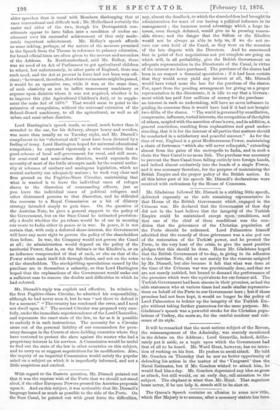With regard to the Eastern question, Mr..Disraeli pointed out that
it was the express wish of the Porte that we should not stand aloof, if the other European Powers pressed the Austrian proposals upon it. And on this subject, it was noticeable that Mr. Disraeli's language leaned as much as possible to the side of the Porte. On the Suez Canal, he pointed out with great force the difficulties, nay, almost the deadlock, to which the shareholders had brought its administration for want of our having a political influence in its management ; the immense moral advantage which a large in- terest, even though deferred, would give us in pressing reason- able views; and the danger that the Sultan or the Khedive would not be always .as able to help us, if we do not se cure our own hold of the Canal, as they were on the occasion of the late dispute with the Directors. And he announced that in point of fact negotiations not yet complete are going on which will, in all probability, give the British Government an adequate representation in the Directorate of the Canal, in virtue of the interest we have purchased. The purchase of the shares had been in no respect a financial speculation ; if it bad been certain that they would never yield any interest at all, Mr. Disraeli would have voted none the leas for the purchase of the shares.. For, apart from the pending arrangement for giving us a proper representation in the directorate, it is idle to say that a Govern- ment which has paid four millions of money for the purchase an interest in such an undertaking, will have no more influence in guiding its concerns than it would have had if it had not bought two-fifths of the shares. "The world is governed by conciliation, compromise, influence, varied interests, the recognition of the rights of others, coupled with the assertion of one's own, and in addition, a general conviction, resulting from explanations and good under- standing, that it is for the interest of all parties that matters should be conducted in a satisfactory and peaceful manner." As for the- time of war, England is a great Mediterranean Power, maintaining a chain of fortresses "which she will never relinquish," extending almost from the gates of the metropolis to India, and in such a chain the Suez Canal is no mean link. The purchase was necessary to prevent the Suez Canal from falling entirely into foreign hands, and indeed almost exclusively into the hands of a single Power, and it was necessary therefore, for the purpose of maintaining the British Empire and the proper policy of the British nation. In all this latter part of his speech Mr. Disraeli's declarations were received with enthusiasm by the House of Commons.


































 Previous page
Previous page